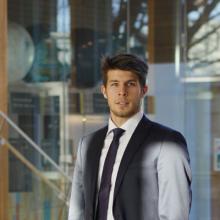Vasilii Triandafilidi
Why did you decide to pursue a graduate degree?
I wanted to make an impact through research and discovering new technologies.
Why did you decide to study at UBC?
I always wanted to explore North America, especially Canada - one of the most open countries for skilled immigration. I chose UBC since it was one of the top schools in Canada.
What is it specifically, that your program offers, that attracted you?
New opportunities, flexibility of my schedule, ability to make an impact through research and commercialization.
What was the best surprise about UBC or life in Vancouver?
Weather and the culture of trust. Vancouver is uniquely placed between mountains for skiing and hiking and the ocean for sailing and swimming. The weather is amazing! But most of all I was surprised how people trust each other in all aspects of their life. Here in Vancouver, people respect each other when they line-up for a bus and mail carriers are not afraid to leave a parcel at your door - no one would steal it.
What aspect of your graduate program do you enjoy the most or are looking forward to with the greatest curiosity?
I enjoy the scientific aspect of my research: finding new things and being curious about my findings. Isaac Asimov, a famous science fiction writer and professor, once said: "The most exciting phrase in science is not 'Eureka!' but 'That's funny...' ".
What do you see as your biggest challenge(s) in your future career?
Our world is changing rapidly: internet of things, robotics, artificial intelligence, social media - all of this is shaping a new world that will be completely different than the world we knew when we were kids. To thrive in the accelerating environment we shouldn't fight it, but embrace it and control it to our advantage. The ability to not be overwhelmed by the abundance of information and the capacity to adapt and learn new things quickly are crucial to succeed in this world.
How do you feel your program is preparing you for those challenges?
To excel in the accelerating world, academic institutions can't be rigid, inflexible entities. They should evolve and facilitate student-driven, experiential learning activities. I have been involved in numerous initiatives such as organizing a start-up program Innovation OnBoard, which aims to create UBC start-ups by matching industry needs and bringing teams of students to tackle these problems and create a venture addressing the challenges. The people in the Faculty of Applied Science and the Chemical & Biological Engineering department are working hard to support us with our initiatives.
What aspects of your life or career before now have best prepared you for your UBC graduate program?
I have started doing research very early. When I was in my second year of my undergraduate, I joined the position of junior researcher at Joint Inst. of High Temperatures of the Russian Academy of Science. The skills that I acquired while doing the research have helped me a lot in UBC.
What do you like to do for fun or relaxation?
I am a competitive Brazilian Jiu-Jitsu practitioner. It helps me out a lot if I have a stressful day. I also play tennis, swim, play football (soccer).
My other passion is learning languages. Since coming to Vancouver, I have learned two (Spanish and Farsi) which is not surprising since I am surrounded by hundreds of different nationalities living in the city. My department alone has people from more than 60 countries!
What advice do you have for new graduate students?
I understand that it is tough to think about your future. I was scared of this thought as well. What should I work on, should I be theoretician or experimentalist? Engineering or arts?
What I would suggest is to do your due diligence when thinking about it. I recommend starting with finding your passion. Read blogs and books (like "Physics of Future" by Michio Kaku or "As the Future Catches You" by Juan Enriquez) and watch compelling documentaries on Youtube about the future of technology. All of these things will help you find things that make you curious and fascinated. Don't worry about your skills for now; your passion is much more important than your qualifications.
When you become deeply passionate about a subject, it is time to act. Research universities and professors who work in the field. You can read their papers, ask them for a Skype call, apply for summer positions, or go to conferences. Another option is to take online courses to educate yourself in the area. This will build your network, shape your vision and get you some skills for the degree.
After that, you can apply for the degrees that you have chosen!
